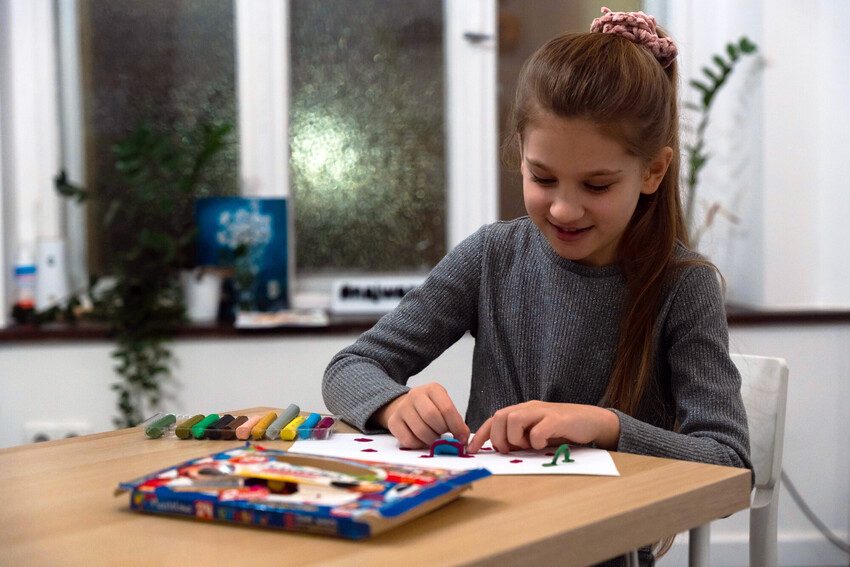Three years of war in Ukraine: education disruptions deepen mental health crisis for children
20 February 2025Five consecutive years of disrupted schooling in Ukraine is having devastating consequences for children’s development and mental wellbeing, child rights NGO Plan International warns as the war enters its fourth year, calling for more support for pupils to continue their studies.

For nearly five years, children in Ukraine have faced significant barriers to learning, starting with the two years lost to the COVID-19 pandemic and followed by the ongoing conflict.
As a result, children who cannot attend school often develop speech problems requiring the support of a speech therapist. Multiple testimonies by teachers warn that certain pupils in grades 5-6 (aged 10-12) are unable to read or hold a pen and write correctly.
More than 3 million children have been forced from their homes since the escalation of war on February 24th, 2022, meaning many are unable to attend school in person. According to the Ukrainian Ministry of Education and Science, around 4.6 million children in Ukraine face barriers to education and 2 million of them have seen their school close down.
Schools have been destroyed
Nearly a third (at least 30%) of the country’s educational facilities have been damaged, and more than 365 schools have been destroyed. For children who have access to online education, technical difficulties, including power outages and limited internet access further hamper their ability to learn.
As a result, learning gaps continue to grow, leaving many children struggling academically.
“For Ukrainian children, education is a distant dream. Years of war have forced countless students out of classrooms, isolating them from their peers and depriving them of the stability that schooling provides. In frontline areas, children haven’t attended school in person for up to five years, relying entirely on online learning—if they have access at all,” said Anastasiia Parubets, Plan International’s Education in Emergencies specialist for Ukraine.
“Even where schools remain open, the constant threat of air raids forces lessons to be interrupted, with children in Kyiv alone enduring more than 1,711 hours of alarms – the equivalent of more than 71 days – since the full-scale war began. The consequences are far more than academic; children are missing out on vital social development, leaving them struggling with the emotional toll of war.”
War has disrupted education
A survey of 1,000 15 to 24 year olds in Ukraine by Plan International found that one in five (19.8%) have missed between one and two years of education as a result of the war.
“Some children in 5th or 6th grade are unable to read because study materials have moved online, and they cannot learn to read word by word with the help of teachers and textbooks,” Parubets continued.
The situation is even more severe for children in rural areas, where the gap has widened significantly. Another study revealed that children living in villages were, on average, four to five years behind their peers.
Equally concerning are the profound mental health consequences of this educational disruption, Plan International warns. Millions of children are experiencing high levels of trauma, anxiety, and depression, as well as difficulty concentrating and processing emotions.
These psychological challenges—exacerbated by the constant threat of airstrikes, the loss of family members, and the destruction of homes—often go unaddressed due to limited resources and support services.
“We cannot underestimate the long-term impact of this crisis on children’s well-being. For many, the war is not just a physical threat but a psychological one, with lasting effects on their emotional and cognitive development,” said Sven Coppens, Plan International’s Director of the East and Central Europe Ukraine Humanitarian Crisis Response.
“Disruptions to education mean children are not only missing out on learning – they are losing vital opportunities to socialise, express themselves, and process the trauma they are enduring. This is an emergency for their mental health and future prospects.”
Creating safe learning spaces
Plan International and its partners have been responding to the crisis by transforming bomb shelters into safe learning spaces, where children have access to catch-up classes, speech therapists, and psychologists.
“Our goal is not only to provide education but to create spaces where children can meet each other, rebuild trust and regain a sense of normalcy,” Parubets emphasised.
In 2025, an estimated 12.7 million people in Ukraine will need humanitarian assistance, including almost 2 million children. For many, education is a lifeline; providing stability, security and hope. Investing in education, mental health, and child protection is critical to Ukraine’s recovery, ensuring children receive the support they need to rebuild their lives and shape the country’s future.

